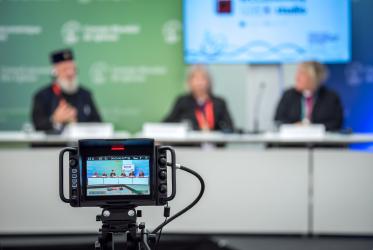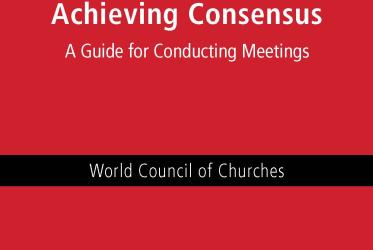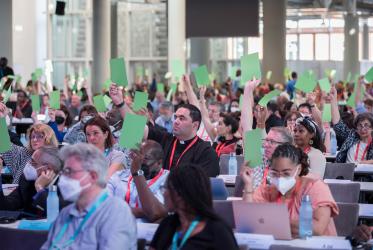XVI.
CONDUCT OF MEETINGS
(Replaces "Rules of
Debate")
1.
General
a)
These provisions for conduct of meetings shall apply to meetings of
the Assembly, the Central Committee, the Executive Committee and all other
bodies of the WCC.During an
Assembly, the titles "President, Moderator and Vice-Moderators of the Central
Committee" shall refer to the persons holding those offices during the outgoing
Central Committee. During the term of a Central Committee such titles shall
refer to the current Presidents and officers of that Central Committee.
b)
"Delegate" shall mean an official representative of a member church
to an Assembly with the right to speak and the responsibility to participate in
decision-making (Rule III.1(a)). For meetings of the Central Committee,
"delegate" shall mean a member of the Central Committee or that member's
substitute (Rule V), with the right to speak and the responsibility to
participate in decision-making.
c)
"Participant" shall include delegates as well as persons invited to
the Assembly or a meeting of the Central Committee as persons with the right to
speak but not to participate in decision-making (Rule III.1(b)).
2.
Categories of Sessions
The Assembly shall sit in one of the following categories of
sessions: General, Hearing, or Decision. The Business Committee shall determine
the category of session appropriate for different parts of the
agenda.
a)
General
Session
General Sessions shall be reserved for ceremonial occasions, public
acts of witness and formal addresses.
Only matters proposed by the Central Committee or by the Business
Committee shall be included in General Sessions. No decisions shall be made
during General Sessions.
b)
Hearing Session
Hearing Sessions shall be designated for plenary presentations,
discussion, dialogue, and exchange of ideas as a resource for developing
understanding, deepening fellowship among member churches and coming to a common
mind on matters on the agenda. A wide range of perspectives shall be encouraged
during Hearing Sessions. No decisions shall be made during Hearing Sessions,
other than to move to a Decision Session, if deemed necessary or to deal with a
Point of Order or Procedural Proposals.
c)
Decision
Session
Decision Sessions shall be designated
for matters requiring a decision, including:
(i)
adoption of the
agenda;
(ii)
proposal for change in the agenda;
(iii)
appointments and
elections;
(iv)
reception or adoption of reports or
recommendations;
(v)
actions to be taken on recommendations or
proposals of committees or commissions, or arising out of Hearing
Sessions;
(vi)
adoption of accounts and financial audits;
and
(vii)
amendment of Constitution or
Rules.
3.
Moderating
Sessions
a)
A
moderator for each session of the Assembly shall be designated before an
Assembly by the outgoing Central Committee, and during an Assembly by the
Business Committee, as follows:
(i)
In
General Sessions one of the Presidents or the Moderator of the Central Committee
shall preside;
(ii)
In Hearing Sessions one of the Presidents,
the Moderator or a Vice-Moderator of the Central Committee, or a delegate with
specific expertise in the subject matter of the Hearing shall
preside;
(iii)
In Decision Sessions the Moderator or a
Vice-Moderator of the Central Committee or other member of the Central Committee
shall preside.
b)
The role of session moderators shall
be:
(i)
to convene the session, including
announcing the category of session;
(ii)
t
o
facilitate and encourage discussion and dialogue, for the exchange and
development of ideas, and to assist the meeting to come to a common
mind;
(iii)
during Decision Sessions, to test any
emerging agreement on a particular point and whether the meeting is ready to
move to a decision by consensus;
(iv)
in the event the category of session is to
change during a session, to announce the change in category, providing a break
in the session to mark the change in category; and
(v)
to close the
session.
c)
The moderator shall consult with the
recorder for the session to ensure that the developing consensus is accurately
noted and any changed wording promptly made available to the
meeting.
d)
All moderators shall undertake specific
training in conducting meetings based upon the consensus model of
decision-making, as described in these Rules and the accompanying
Manual.
4.
Moderator of the Assembly
The Moderator of the Assembly shall announce the opening, suspension
and the adjournmentof the
Assembly.
5.
Official Minutes, Records and
Reports
a)
The
Business Committee shall appoint recorders from among Delegates for each
Decision Session. Their role shall be to to follow the discussion of a Decision
Session, to record the language of the emerging consensus, including final
language of decisions taken, and to assist the moderator of the session in
discerning an emerging consensus. Recorders shall also assist the moderator in
ensuring that the final agreed wording of a proposal is translated and available
to delegates before a decision is made.
b) The Business Committee shall appoint
rapporteurs for each Hearing Session and
for committee meetings for which official minutes are not maintained, to prepare
a report of the meeting including major themes and specific proposals.. A
rapporteur appointed for a committee meeting shall function as a recorder of
that meeting.
c)
The Business Committee shall appoint
minute-takers to record the official minutes of General, Hearing and Decision
Sessions of an Assembly or any meeting for which formal minutes must be kept,
and shall include a record of the discussion, motions and decisions. The minutes
will normally incorporate by reference any report of the meeting. The minutes
shall be signed by the moderator and the minute-taker for the session and shall
be sent to the participants of the meeting. For all minutes other than minutes
of an Assembly, if there is no objection within six months from the sending of
the minutes, the minutes shall be considered to be accepted. The first Central
Committee meeting following an Assembly shall confirm the minutes of the
Assembly.
d)
Decision Sessions will usually produce
official minutes and a record and/or report.
e)
If, after the close of a meeting, a member church declares that it cannot
support a decision of the meeting, the member church may submit its objection in
writing and have its position recorded in the minutes or report of a subsequent
meeting.
The decision itself shall
not be rescinded by this action.
6.
Agenda
a)
Matters may be included on the agenda of a
meeting according to Rule III.3 and procedures established by the Business and
Programme Committees, and any other committee established by Central Committee
for that purpose. Normally, matters included on an agenda will be based upon
reports, recommendations or proposals that previously have been fully considered
and have the consensus support of the proposing group or committee.
b)
The Business Committee shall ensure that
the moderator is advised before each session, and if appropriate during breaks
within a session, as to the conduct of the business and the priority of various
agenda items.
c)
A delegate may propose to the Business
Committee an item of business to be included on, or any change in, the
agenda.
If after consideration the
Business Committee has not agreed to the proposal, the delegate may appeal the
decision to the Moderator of the Assembly in writing. The Moderator shall at a
convenient time inform the Assembly of the proposal, and a member of the
Business Committee shall explain the reasons for this refusal.
The delegate may give reasons for
proposing it.
The Moderator shall
then without further debate put the following question: Shall the Assembly
accept this proposal? If the Assembly agrees to accept the proposal, the
Business Committee as soon as possible shall bring proposals for the inclusion
of the matter or the change in the agenda.
d)
Matters concerning
ecclesiological self-understanding -
Where a matter
being raised is considered by a delegate to go against the ecclesiological
self-understanding of his or her church, the delegate may request that it not be
submitted for decision. The moderator shall seek the advice of the Business
Committee in consultation with this delegate and other members of the same
church or confession present at the session. If agreed that the matter does in
fact go against the ecclesiological self-understanding of the delegate's church,
the moderator shall announce that the matter will be removed from the agenda of
the Decision Session and may be considered in a Hearing Session.
The materials and minutes of the
discussion shall be sent to the member churches for their study and
comment.
e)
Subject to the provisions of this Rule,
the agenda shall be proposed, amended and/or adopted in accordance with Rule
III.3 and III.5.
7.
Speaking
a)
In
Hearing Sessions, participants wishing to speak either may submit to the
moderator a written request or may queue at the microphones when the moderator
so invites, but may speak only when called by the
moderator.
b)
In
Decision Sessions, only delegates may speak. Delegates wishing to speak either
may submit to the moderator a written request or may queue at the microphones
when the moderator so invites, but may speak only when called by the
moderator.
c)
The moderator shall decide who shall
speak, ensuring that a fair distribution of opinions is heard, and may take
advice on the order of speakers from a small sub-committee of the Business
Committee. If time allows and others are not left unheard, the moderator may
permit speakers to intervene more than once.
d)
When called by the moderator, a speaker
shall speak from a microphone, first stating his or her name, church, country,
and role at the meeting, and shall address all remarks to the moderator.
e)
Remarks will normally be limited to three
minutes; however, the moderator may use discretion in allowing extra time if
there is a difficulty in language or interpretation or if the issues being
discussed are unusually complex.
f)
Procedural Proposals - Hearing or Decision
Sessions: Provided that a speaker is not interrupted, a delegate may ask for
clarification of the pending matter or may raise suggestions about
procedure.
The moderator
immediately shall provide clarification or respond to the suggestion for change
of procedure.
g)
Points of Order - Hearing or Decision
Session: This provision is available to question whether procedures being
followed are in accordance with these Rules, to object to offensive language, to
make a point of personal explanation, or to request that a meeting move to
closed session. Points of Order may be raised by a participant at any time, even
by interrupting another speaker.
A
participant gains the attention of the moderator by standing and calling, "Point
of Order!" The moderator shall ask the participant to state the Point of Order
and then (without discussion) shall rule on it
immediately.
h)
If any delegate disagrees with the
moderator's decision on a procedural proposal or point of order, the delegate
may appeal against it.
In this case
the moderator will put this question, without discussion, to the meeting: "Does
the meeting concur with the decision of the moderator?"
The delegates present shall decide the
question according to the decision-making procedures then being
employed.
8.
Reaching Consensus: Seeking the Common
Mind of the Meeting
a)
Consensus shall be understood as seeking
the common mind of the meeting without resort to a formal vote, in a process of
genuine dialogue that is respectful, mutually supportive and empowering, whilst
prayerfully seeking to discern God's will.
b)
Decisions will normally be by consensus,
unless otherwise specified by the Rules.
c)
A consensus decision on a particular
matter shall be recorded when one of the following occurs:
(i)
all delegates are in agreement
(unanimity); or
(ii)
most are in agreement and those who
disagree are satisfied that the discussion has been both full and fair and do
not object that the proposal expresses the general mind of the meeting.
d)
A consensus decision
shall mean that there is agreement about the outcome of a discussion. This may
mean agreement to accept a proposal or a variation of a proposal; it also may
mean agreement about another outcome, including agreement to reject a proposal,
to postpone a matter, that no decision can be reached, or that there are various
opinions that may be held. When consensus has been reached that various opinions
can be held concerning a matter, those various opinions shall be recorded in the
final wording of the minutes and the report and the record of the
meeting.
9.
Decision-making by Consensus
a)
A proposal or recommendation considered in
a Decision Session may be affirmed, modified or rejected.
Delegates may suggest modifications, and
the moderator may allow discussion on more than one modification at a time.
Reaching a common mind may require a series of steps, if there is a variety of
opinions being expressed.
As
discussion proceeds, the moderator may ask the meeting to affirm what is held in
common before encouraging discussion on those aspects of a proposal about which
more diverse opinions have been voiced.
b)
To assist the moderator in discerning the
mind of the meeting and to move efficiently toward consensus, the recorder of
the session shall maintain a record of the discussion. Delegates may be provided
with indicator cards to facilitate participation.
c)
A
delegate or the moderator may suggest that the matter under discussion be
referred for further work to an appropriate group holding a range of points of
view. This suggestion itself shall be tested to discern the mind of the
meeting.
If agreed, the Business
Committee shall schedule consideration of the matter for a later session.
d)
When it seems that the meeting is close to
agreement on an outcome, the moderator shall ensure that the wording of the
proposal (or the proposal as varied during the course of the discussion) is
clear to all delegates, and then test whether there is consensus on that
outcome..
If all are agreed
consistent with Rule XVI. 8(c)(i), the moderator shall declare that consensus
has been reached and the decision made. If the meeting is not unanimous, the
moderator shall invite those who hold a minority view to explain their reasons
if they wish and to indicate whether they can agree with a decision pursuant to
Rule XVI .8 (c)(ii). If so, consensus shall be declared.
e)
If, after every effort has been made to
reach consensus, agreement cannot be reached and it is the opinion of an officer
or the Business Committee that a decision must be made before the meeting
concludes, the moderator shall ask the Business Committee to formulate a
proposal for how the matter may be considered again in a new form.
At the later Decision Session where this
new approach is considered, the meeting itself shall decide whether a decision
must be made at this meeting, and if so, shall proceed on any one of the
following courses, which may be followed sequentially:
i)
to work further towards consensus on the
proposal in its new form;
ii)
to work to reach agreement among most
delegates with some delegates recording an objection, in which event a meeting
shall record acceptance of the proposal, providing that each delegate who does
not agree is satisfied with that outcome and has the right to have his or her
viewpoint recorded in the minutes, in the report, and in the record of the
meeting; or
iii)
to move into voting procedures to decide
the matter (Rule XVI.10).
f)
When a meeting discusses by consensus
procedures a matter for which decision must be reached at that meeting and there
is no ready agreement in accordance with Rule XVI.9(e)(i) or (ii), the moderator
may offer a procedural proposal: "That the meeting resolve the proposal now by
vote". Except for matters described in Rule XVI.6(d) "Matters concerning
ecclesiological self-understanding",
the moderator shall announce that a vote to decide this change of
procedure shall be taken. Delegates shall indicate by voting whether they agree
that the matter shall be decided by a vote. If eighty-five percent of delegates
present vote in favor of moving the matter to a voting process, the matter shall
so move. If fewer than eighty-five percent of delegates present vote in favor of
moving the matter to a voting process, the matter shall not so move, and the
meeting shall decide, again by vote of eighty-five percent of delegates present,
whether discussion should continue to achieve consensus or whether discussion
should be discontinued.
10.
Decision-making by vote
a)
Some matters require decision
by vote, rather than by consensus.
These include:
(i)
Constitutional changes (two-thirds
majority);
(ii)
Elections (which follow specific rules in
each case);
(iii)
Adoption of yearly accounts and of the
financial audit report (simple majority).
b)
For matters that have been moved from
consensus procedures to decision-making by vote in accordance with Rule
XVI.9(e)(iii) or (f), and for matters reserved to a voting procedure according
to subsection (a) of this section, the following procedures shall be
followed:
(i)
All motions must be moved and seconded by
a delegate, and the mover has the right to speak first.
(ii)
In discussion following the seconding of a
motion, no delegate may speak more than once, except that the delegate who moved
the motion may answer objections at the end of the
discussion.
(iii)
Any delegate may move an amendment, and if
a seconder supports it, the amendment shall be considered simultaneously with
the original proposal.
(iv)
When discussion is concluded, including
the right of mover to reply (see (ii) above), the moderator shall call for the
vote and shall put any amendment first. If approved, it will be incorporated in
the original proposal, which will then be put to the vote without further
discussion.
(v)
If the mover seeks to withdraw a motion or
amendment during the discussion, the moderator will seek the consent of the
meeting for the withdrawal.
A
delegate may move to close the discussion, but in doing so shall not interrupt a
speaker. If seconded, the moderator shall call for a vote on this motion
immediately without discussion. If two-thirds of the meeting agree, the voting
process will then begin. If the motion fails, discussion will proceed, but the
same motion to close discussion may be moved again as the discussion continues,
but not by the delegate who moved it the first time.
c) Voting shall be by show of hands or indicator cards and the
moderator shall ask first for those in favor, then for those against, and
finally for those who wish to abstain from voting. The moderator shall announce
the result of the vote immediately.
d)
If the moderator is in doubt, or for any
other reason decides to do so, or if a delegate requests it, a vote on the
matter shall be taken immediately by count of a show of hands or indicator
cards.
The moderator may call
tellers to count those voting and abstaining. A delegate may ask that voting be
by secret written ballot, and if seconded and if a majority of delegates present
and voting agree, a secret written ballot shall be taken. The moderator shall
announce the result of any count or secret written ballot.
e)
A
majority of the delegates present, including those who choose to abstain from
voting, shall determine a matter being decided by vote unless a higher
proportion is required by the Constitution or these Rules.
If the vote results in a tie, the matter
shall be regarded as defeated.
f)
If the moderator wishes to participate in
the discussion, he or she shall relinquish the position of moderator of the
session to another presiding officer until the matter has been
resolved.
g)
A
moderator entitled to vote as a delegate may do so, but may not cast the
decisive vote in the event of a tie.
h) Any two delegates who voted with the majority for a previously
approved matter may request that the Business Committee propose reconsideration
of the matter.
The Business
Committee shall bring the proposal to the next Decision Session and may express
an opinion as to whether the matter should be reconsidered.
Reconsideration shall take place only if
two-thirds of delegates present agree.
i)
Anyone voting with a minority or
abstaining from voting may have his or her opinion recorded in the minutes, in
the report, and/or the recommendation of the meeting.
11.
Languages
The working languages in use
in the World Council of Churches are English, French, German, Russian and
Spanish. The General Secretary shall make reasonable effort to provide
interpretation for any one of those languages into the others and
shall
endeavor
to
provide written translation of the specific wording of proposals. A participant
may speak in another language only if he or she provides for interpretation into
one of the working languages. The General Secretary shall provide all possible
assistance to any participant requiring an interpreter.



